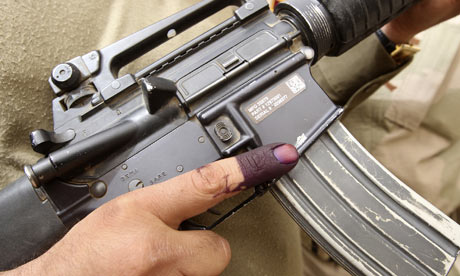My friend, your thoroughgoing (if misguided

) posts deserve a similarly detailed response, which I have been unable to complete, but I intend to provide. On a couple of points we clearly agree:
A very good discussion to date which has been most thought-provoking. Bravo sir.
Indeed! That is why I enjoy our discussions so immensely - even when you are wrong.

Okay, that is too harsh. Misguided.

Honestly, ribbing aside, there is a great deal that you have written that I substantially agree with, but we are approaching the question from different angles. My approach, from the outset, was to lay out what the legal standard for a prosecution of "genocide" is, then apply those standards to the current circumstance. You, however, begin by looking at the practical realities of enforcement in international affairs and dismissing (if that is not too harsh a term) the application of the concept entirely, as unworkable, or at least, inequitable. (At the core, I believe you are a pacifist, as am I.) They are, in fact, different worldviews that may lead to Scotland by different routes. But, I think those differences are important, so I'll belabor them. Indeed, I hope to convince you (and other dear readers) otherwise.
It's going to take a number of posts, and I will necessarily elide much of your excellent disquisition to meet character (of the typographic kind) limitations, but I hope to respond to the gist and ask you correct me if I miss anything of substance. Let us continue...
Russia's hoped-for war of rapid manoeuvre plus shock and awe to topple the Kiyv regime's grasp on power in Ukraine failed.
We agree that is the current circumstance. (I would submit it was always inevitable.)
The shift is now to a war of brutal and very destructive attrition where the goal is to kill, maim and de-house so many Ukrainians that they lose their will to fight and then submit to conquest and subjugation.
Here I disagree.
There was not a shift. Perhaps they
hoped not to have to pursue that course, but massed artillery barrage is always "Plan A" in the Soviet manual (which is the playbook Putin lives in - much more on that later). The
Russian style of combat has, since at least the Tsars, been one of brutality and massed, indiscriminate, firepower. Russians fetishize artillery, and victory by any means. It's well-established historically and doctrinally. That is
NOT the way of "modern warfare" (post WWII, and particularly post-Vietnam) as trained in the Western nations (under the NATO umbrella). From an outsider, these distinctions may not be as noticeable, but they do definitively exist and are profound. Again, more on this as we go.
That's how war works, and no law will change that.
Not true, as I will elucidate.
Whether the law can change that is a matter of conjecture and opinion (and ultimately the point of this thread). I insist that it can, it has, and it will. That is, in fact, the core of my belief system and life's work.
The war between Ukraine and invading Russia is a total war... Thus the whole population is attacked even if there is no intention to kill non-resisting civilians. There is however an intention to kill even passive civilians in order to create terror and to break the will of Ukrainians to fight.
There's a lot of unpacking to do here. Yes, from
Putin's perspective, this is a total war, and it has certainly become existential to Ukrainians. But, your
additional assertions I take
great exception to. "where every civilian who is or could be aiding the Ukrainian armed forces is a target for destruction." and ""The fact that those civilians are hidden in built-up areas (BUA) and intermingled with Ukrainian military and civilian combatants who are also hidden in the BUAs means that Russian artillery, rocketry, missile strikes and airstrikes have no way to distinguish between passive civilians and active combatants."
There is a great deal of excellent literature on this topic, but I'll cut to the chase -
Russia (and you, I'm afraid)
approaches warfare with a pre-WWII mindset. There has been a huge change in how war is and should be conducted in the last 75 years, at least by developed nations, in capabilities, lethality, and most importantly,
precision. From precision comes a
heightened, not limited, requirement for
distinction (between lawful and unlawful targets) - what I consider the most important foundation of International Humanitarian Law (IHL).
More to follow... {<insert suspenseful music here>}


